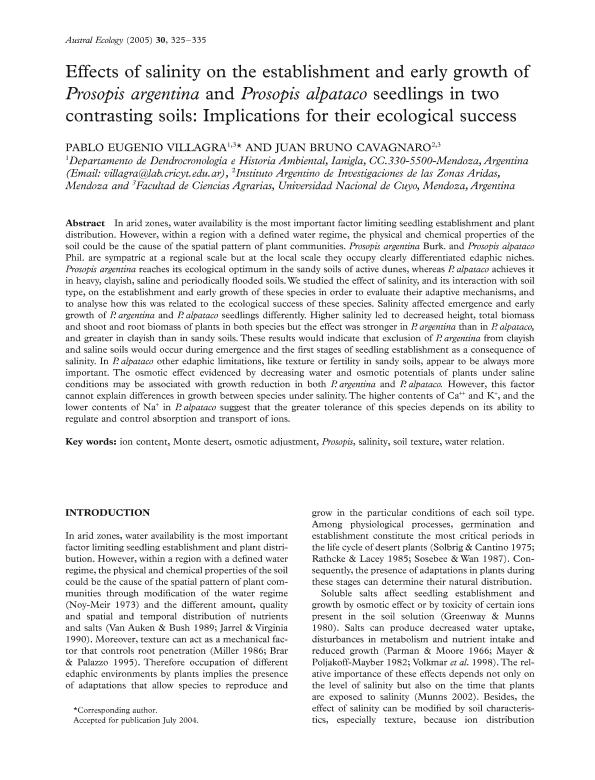Artículo
Effects of salinity on the establishment and early growth of Prosopis argentina and Prosopis alpataco seedlings in two contrasting soils: Implications for their ecological success
Fecha de publicación:
12/2005
Editorial:
Wiley Blackwell Publishing, Inc
Revista:
Austral Ecology
ISSN:
1442-9985
Idioma:
Inglés
Tipo de recurso:
Artículo publicado
Clasificación temática:
Resumen
In arid zones, water availability is the most important factor limiting seedling establishment and plant distribution. However, within a region with a defined water regime, the physical and chemical properties of the soil could be the cause of the spatial pattern of plant communities. Prosopis argentina Burk. and Prosopis alpataco Phil. are sympatric at a regional scale but at the local scale they occupy clearly differentiated edaphic niches. Prosopis argentina reaches its ecological optimum in the sandy soils of active dunes, whereas P. alpataco achieves it in heavy, clayish, saline and periodically flooded soils. We studied the effect of salinity, and its interaction with soil type, on the establishment and early growth of these species in order to evaluate their adaptive mechanisms, and to analyse how this was related to the ecological success of these species. Salinity affected emergence and early growth of P. argentina and P. alpataco seedlings differently. Higher salinity led to decreased height, total biomass and shoot and root biomass of plants in both species but the effect was stronger in P. argentina than in P. alpataco, and greater in clayish than in sandy soils. These results would indicate that exclusion of P. argentina from clayish and saline soils would occur during emergence and the first stages of seedling establishment as a consequence of salinity. In P. alpataco other edaphic limitations, like texture or fertility in sandy soils, appear to be always more important. The osmotic effect evidenced by decreasing water and osmotic potentials of plants under saline conditions may be associated with growth reduction in both P. argentina and P. alpataco. However, this factor cannot explain differences in growth between species under salinity. The higher contents of Ca++ and K+, and the lower contents of Na + in P. alpataco suggest that the greater tolerance of this species depends on its ability to regulate and control absorption and transport of ions.Prosopis argentina Burk. and Prosopis alpataco Phil. are sympatric at a regional scale but at the local scale they occupy clearly differentiated edaphic niches. Prosopis argentina reaches its ecological optimum in the sandy soils of active dunes, whereas P. alpataco achieves it in heavy, clayish, saline and periodically flooded soils. We studied the effect of salinity, and its interaction with soil type, on the establishment and early growth of these species in order to evaluate their adaptive mechanisms, and to analyse how this was related to the ecological success of these species. Salinity affected emergence and early growth of P. argentina and P. alpataco seedlings differently. Higher salinity led to decreased height, total biomass and shoot and root biomass of plants in both species but the effect was stronger in P. argentina than in P. alpataco, and greater in clayish than in sandy soils. These results would indicate that exclusion of P. argentina from clayish and saline soils would occur during emergence and the first stages of seedling establishment as a consequence of salinity. In P. alpataco other edaphic limitations, like texture or fertility in sandy soils, appear to be always more important. The osmotic effect evidenced by decreasing water and osmotic potentials of plants under saline conditions may be associated with growth reduction in both P. argentina and P. alpataco. However, this factor cannot explain differences in growth between species under salinity. The higher contents of Ca++ and K+, and the lower contents of Na + in P. alpataco suggest that the greater tolerance of this species depends on its ability to regulate and control absorption and transport of ions.
Archivos asociados
Licencia
Identificadores
Colecciones
Articulos(IANIGLA)
Articulos de INST. ARG. DE NIVOLOGIA, GLACIOLOGIA Y CS. AMBIENT
Articulos de INST. ARG. DE NIVOLOGIA, GLACIOLOGIA Y CS. AMBIENT
Articulos(IBAM)
Articulos de INST.DE BIOLOGIA AGRICOLA DE MENDOZA
Articulos de INST.DE BIOLOGIA AGRICOLA DE MENDOZA
Citación
Villagra, Pablo Eugenio; Cavagnaro, Juan Bruno; Effects of salinity on the establishment and early growth of Prosopis argentina and Prosopis alpataco seedlings in two contrasting soils: Implications for their ecological success; Wiley Blackwell Publishing, Inc; Austral Ecology; 30; 3; 12-2005; 325-335
Compartir
Altmétricas




